As a responsible cat owner, understanding the viruses that can affect your cat’s health is crucial. Feline Immunodeficiency Virus (FIV) and Feline Leukemia Virus (FeLV) are two viral infections that can severely impact a cat’s immune system. Although they can go unnoticed for long periods, early detection and intervention can make a significant difference in your cat’s health and longevity.
In this article, we’ll explore what FIV and FeLV are, how they spread, the symptoms to watch for, and why early detection is so important for your cat’s well-being.
What Is Feline Immunodeficiency Virus (FIV)?
FIV is a retrovirus that weakens a cat’s immune system, making them more vulnerable to other infections. Often referred to as “feline AIDS,” FIV shares similarities with HIV in humans but only affects cats.
Unlike FeLV, FIV is primarily spread through deep bite wounds. It is less likely to be transmitted through casual contact, such as grooming or sharing food bowls.
How Does FIV Spread?
Bite Wounds: The primary mode of transmission is through deep bite wounds, usually from fights between cats.
Mother to Kitten: FIV can also be passed from an infected mother cat to her kittens, either during birth or nursing, though this is less common.
Symptoms of FIV
FIV may not show immediate symptoms, and infected cats can appear healthy for years. When symptoms do arise, they may include:
Recurrent infections, especially upper respiratory infections
Weight loss and lethargy
Poor coat condition or hair loss
Fever and dental issues
Chronic health problems due to a weakened immune system
What Is Feline Leukemia Virus (FeLV)?
FeLV is another viral infection that severely impacts a cat’s immune system. It is more contagious than FIV and can lead to serious conditions like anemia, lymphoma, and other cancers. FeLV is a leading cause of cancer in cats.
How Does FeLV Spread?
Saliva and Close Contact: FeLV is primarily spread through saliva, so it can be transmitted through grooming or sharing food bowls.
Mother to Kitten: Like FIV, FeLV can be passed from an infected mother to her kittens during birth or nursing.
Other Fluids: The virus can also be spread through blood, urine, and feces.
Symptoms of FeLV
FeLV can remain dormant in a cat’s body for an extended period, and symptoms might not appear until the virus has caused significant damage. Some signs to look for include:
Loss of appetite and weight loss
Pale gums and other signs of anemia
Swollen lymph nodes
Respiratory issues (such as coughing or nasal discharge)
Vomiting and diarrhea
Poor coat condition and lethargy
Why Early Detection is Crucial
Both FIV and FeLV compromise a cat’s immune system, leaving them vulnerable to other infections and health complications. Early detection of either virus can greatly improve your cat’s chances of living a long, healthy life. Here’s why early detection is so important:
Prevents Further Spread: If a cat is diagnosed with FIV or FeLV, early isolation can help prevent the virus from spreading to other cats, especially in multi-cat households or shelters.
Better Management: While there is no cure for these viruses, early diagnosis allows for better management. Supportive care and regular vet visits can help your cat live a healthy, comfortable life for years.
Prevents Severe Complications: Both viruses can lead to severe complications, including cancers and other infections. Early intervention can reduce the risk of these serious conditions.
Improves Quality of Life: Cats that are diagnosed early and treated properly are more likely to experience fewer health problems and a better quality of life.
How to Test for FIV and FeLV
Since both FIV and FeLV can remain undetected for a long time, regular testing is the most effective way to catch these viruses early. There are a variety of methods to test for FIV and FeLV, including blood tests and rapid antigen/antibody tests.
While it’s always best to consult your vet for a thorough examination and diagnosis, there are now convenient, at-home testing options available. These tests can provide fast results, allowing you to detect FIV and FeLV before the viruses cause serious harm.
Conclusion
FIV and FeLV are serious viral infections that can significantly impact your cat’s health. Both viruses weaken the immune system, leaving cats more susceptible to other diseases and complications. The good news is that with early detection, these viruses can be managed, and affected cats can live long, healthy lives with proper care.
Regular testing is an essential part of keeping your cat’s health in check. If you're concerned about FIV or FeLV, talk to your vet about testing options and consider getting a reliable home testing kit to monitor your cat’s health regularly.
Early detection is the first step toward ensuring your cat stays happy and healthy for years to come.
If you're interested in home testing, ISENVO’s Rapid FIV/FeLV Combo Test Kit provides an easy, reliable solution to check for both viruses at home, offering fast results in just 10 minutes. This test can be an excellent way to stay proactive about your cat’s health.

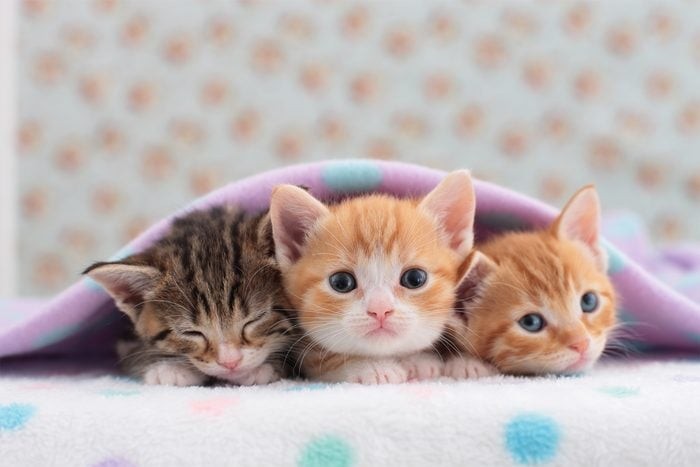


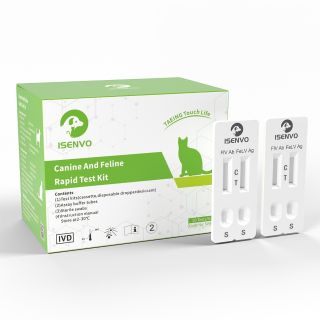
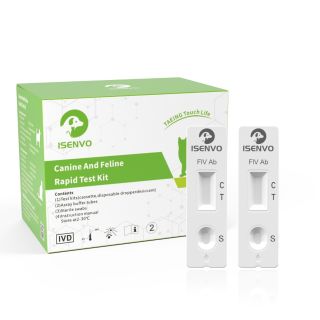




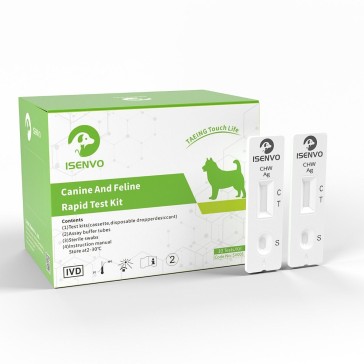
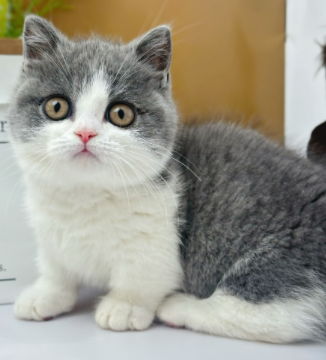
Validate your login